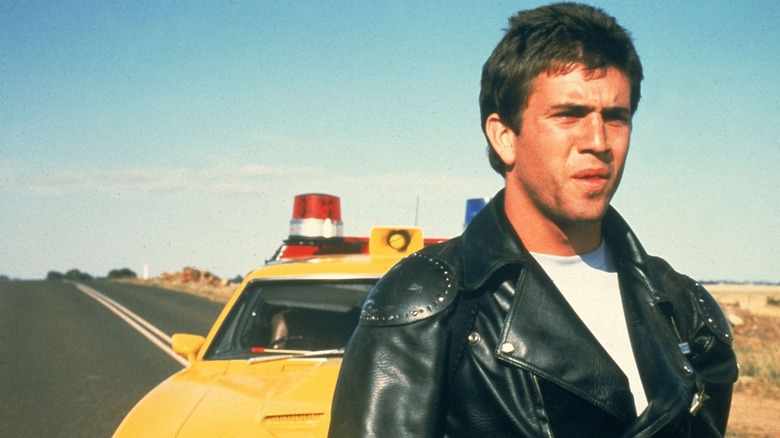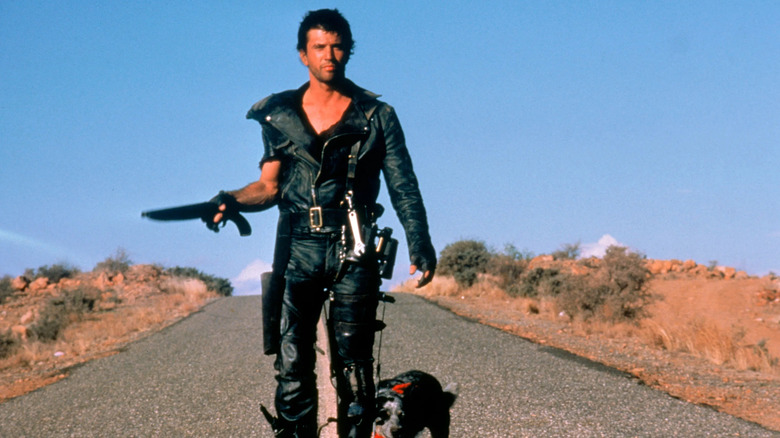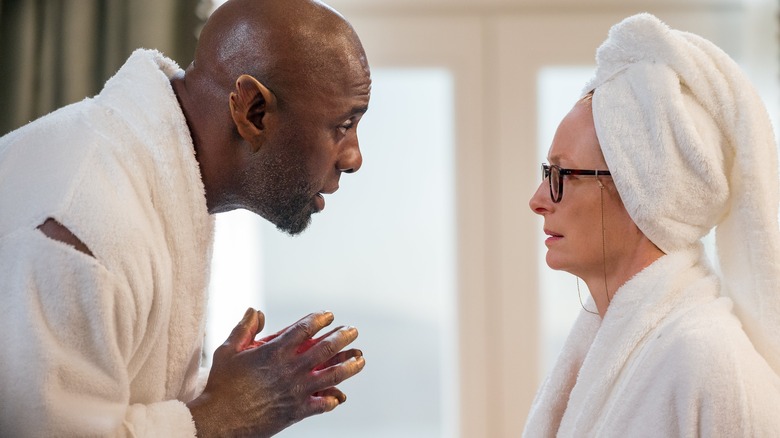Filming The First Mad Max Was A 'Disaster' In The Eyes Of Director George Miller
Like the hazy fogs that often coat their landscapes, dystopian and post-apocalyptic films are heavy and dense. They ponder frightening futures while critiquing present-day social issues that might lead us there. Visually, they are often gritty and bleak, with stark images of what might be waiting for us in the years to come.
Any dystopian film worth its salt asks its viewers to process some deep issues. The "Blade Runner" films explore humanity and empathy. "V for Vendetta" presents a futuristic London under total surveillance and ruled by an oppressive police force. "The Matrix" warns of our reliance on technology and questions the very notion of reality.
A dystopian film is an ambitious project to begin a film career, but that's exactly what Australian filmmaker George Miller did with the 1979 film "Mad Max." The movie is a simple revenge story that leans on elaborate stunts and unique visuals to do the heavy lifting. The gamble paid off and "Mad Max" was an instant hit, even though Miller initially thought he had a disaster on his hands.
'The film was a complete disaster'
George Miller didn't start out as a filmmaker. In his 20s, he was an ER doctor. While completing his residency in medical school he was also honing his skills as a director. By 1978, Miller had quit medical school and borrowed enough money to produce his first feature film, the dystopian "Mad Max."
In the film, war and oil shortages (a very real thing in the 1970s) create a post-apocalyptic setting where only the vilest and most vengeful survive. Miller has described the film as taking place "next Wednesday, when all the bad things we read in the news come to pass." When a former cop's family is murdered, he sets out for revenge against the gang responsible for their deaths.
Miller made "Mad Max" on a shoestring budget, using a then-unknown Mel Gibson as the eponymous protagonist. In an interview with The Guardian, Miller admitted that the production made him question if he was cut out to be a filmmaker:
"The film was a complete disaster to me in terms of what I wanted to do. I really thought I wasn't cut out to make films. We had no money for an editor, so I cut the film myself for a year. And every day for a year I was faced with the evidence of what I hadn't done, what I'd failed to do. Every day facing this film, this wreck."
As it turns out, "Mad Max" was anything but a disaster, becoming a global hit. Miller wowed audiences with innovative camera shots and editing that were far ahead of their time. The success of the film kickstarted a franchise that spawned several blockbuster sequels and allowed Miller to explore far beyond the Australian wastelands.
The Australian Martin Scorsese
You might (and maybe should) consider Miller an Australian Martin Scorsese. At age 77, he's been making films for more than 50 years, if you count the short films he directed before "Mad Max." And like Scorsese, he continues to push the boundaries of filmmaking, making up new rules as he goes while producing arguably his best, most breathtaking work yet, all while in his seventies.
For the long-awaited sequel "Mad Max: Fury Road," Miller broke the long-established rule of thirds cinematography technique, framing the action of the entire film in the center. Miller also boldly shifted the franchise protagonist from male to female, making Tom Hardy's Max a secondary character and allowing Charlize Theron's Furiosa to take the spotlight.
Although Miller is best known for the "Mad Max" franchise, his filmography is surprisingly diverse. Fans of his post-apocalyptic films might be surprised to see titles like "The Witches of Eastwick" and "Babe" on his resumé. Miller's sole Academy Award came as the result of an animated film of all things, winning the Oscar for Best Animated Feature for his 2006 film "Happy Feet."
And though there are two "Mad Max" films on the horizon — both prequels to "Mad Max: Fury Road" -– that hasn't stopped Miller from genre-hopping again. Last August, he released the fantasy drama "Three Thousand Years of Longing" starring Tilda Swinton and Idris Elba.
It has been an amazing career for a director who considered his first film a "disaster." And in his fifth decade of filmmaking, Miller is showing no signs of slowing down.


